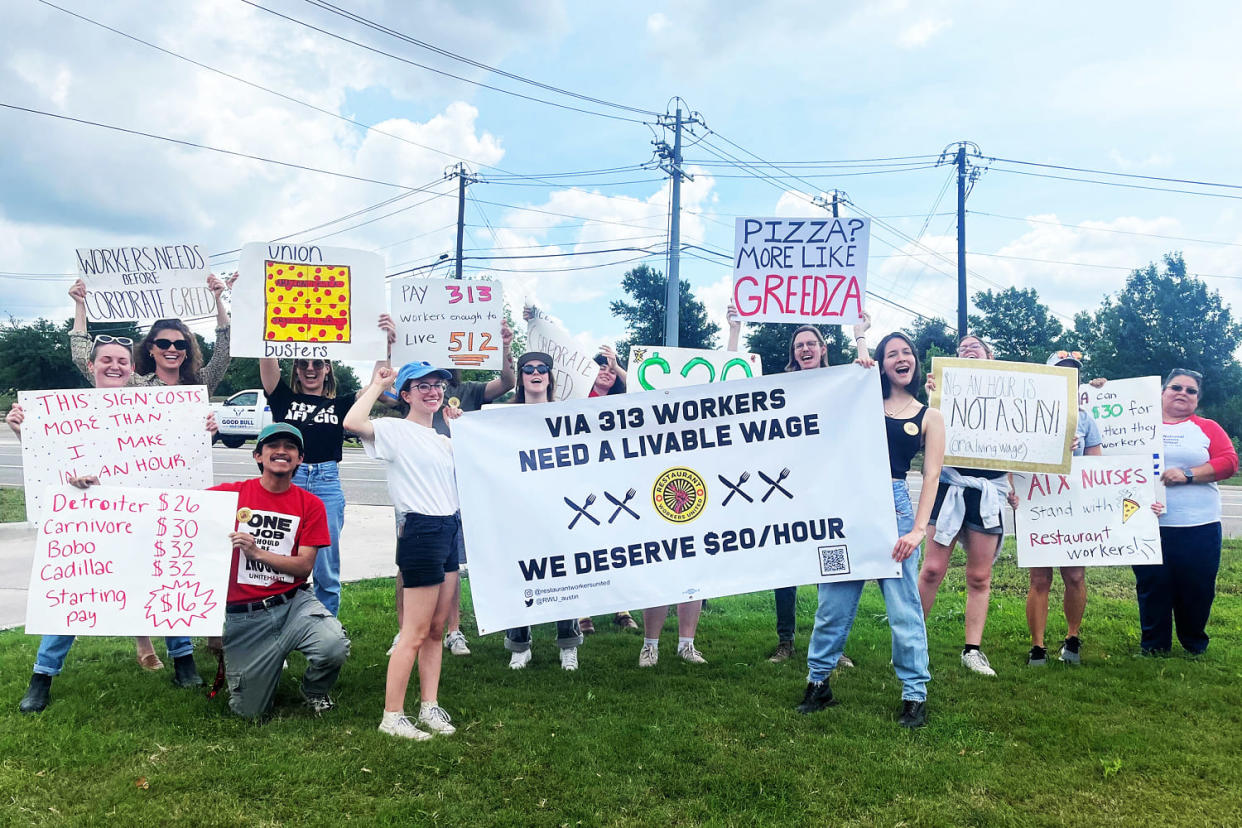Ending tip taxes? Restaurant workers and advocates say it’s a low priority
Donald Trump wants to eliminate taxes on tips, hoping to shore up support among service workers. Some aren’t impressed.
“The call to end taxes on tips is just a misguided way of trying to fix a problem of uplifting the lower class,” said Elyanna Calle, 21, a manager and bartender at the Beer Plant, an Austin-based vegan restaurant who’s also an organizer for Restaurant Workers United, a grassroots labor group.
The policy debate comes amid sturdy pay and hiring gains for blue-collar and part-time workers, even as higher living costs weigh on households’ finances and economic outlooks.

While the hospitality industry continues to add jobs, many hotels, bars and restaurants are hitting the brakes on hiring and pay as more consumers tighten their going-out budgets. That has fueled labor advocates’ calls to bolster service workers’ livelihoods in a hotly contested election year.
“Trump and the Republicans are noting the polling that shows that the absolute top issue for our population — and frankly most populations this cycle — is the rising cost of living and jobs with living wages,” said Saru Jayaraman, president of the labor advocacy group One Fair Wage and director of the Food Labor Research Center at University of California, Berkeley. “We wish that Democrats would pay some more attention.”
However, she said, “getting rid of taxes on tips gives a once-a-year, nice little bonus to workers, but frankly not much. What they need is something every day of the year, when they’re struggling to pay rent.”
“It’s not just the wrong solution, but a fake solution,” Jayaraman added.
Trump didn’t go into detail on the idea, which would require Congress' approval. But speaking at a rally this month in Nevada — a swing state with the highest concentration of tipped workers in the country — the presumptive 2024 GOP nominee vowed to prioritize the policy “first thing in office.”

On Thursday, four Republican senators unveiled a bill, backed by the National Restaurant Association, that would let tax filers take a 100% deduction on earnings from tips.
A recent analysis by the nonpartisan Committee for a Responsible Federal Budget found such a move would shrink federal revenue by $150 billion to $250 billion over a decade. Some Republicans cited the potential deficit impact in voicing skepticism about Trump’s proposal, though others rallied behind it. At least one prominent Democrat up for re-election, Nevada Sen. Jacky Rosen, has also backed tax cuts for tip earners.
Some workers and labor groups say they’d prefer a boost in base wages to tax relief on tips.
Calle said she left her previous employer, an Austin pizzeria, following staff efforts to unionize and demand higher pay. She and the more than 100 other RWU members have since become an advocacy group advising other service workers looking to organize.
“Oftentimes the focus will go on to tip culture,” Calle said, “when the real issue is that employers aren’t paying [enough] for labor.”
Many consumers appear to agree — but far from a majority. In a recent Bankrate survey, 37% of respondents said employers should pay better so staffers can rely less on tips; only 11% said they’d be willing to pay more to avoid tipping entirely.
At least 25 states have raised or will raise their minimum wage this year, with major cities like New York and Chicago mandating a full minimum wage for tip earners. Many places have both a minimum wage and a lower “sub-minimum” one for tip earners, in which gratuities are expected to make up the difference between the two.
In Texas, the subminimum is $2.13 per hour, with employers required to pay the balance only when tips don’t add up to the federal $7.25 hourly pay floor.
Still, Calle was sympathetic to restaurant operators who resist calls for higher base wages. “I’ve seen both sides,” she said, citing small businesses where slim profit margins make it “really hard to be able to pay workers.”
Tax debates are set to intensify. The November election will determine the fate of the tax cuts Republicans passed along party lines in 2017, most of which are set to expire next year. A key factor is the corporate tax rate, which was permanently lowered from 35% to 21%, though Democrats have floated the idea of raising it again.
“They’re perfectly happy to get rid of taxes on corporations, and they’re perfectly happy to let customers pay for their workers,” Jayaraman said of lawmakers who oppose minimum wage increases but support scrapping tip taxes.
“Every time we try to raise the wage,” she added, “we hear from nasty employers who say things: ‘Well, these lazy workers, they don’t even pay taxes on their tips.’”
“Restaurant operators and tipped employees conduct extensive training on how and why to report tips,” Aaron Frazier, vice president of public policy at the National Restaurant Association, said in a statement. “Because of this effort, tip reporting has improved substantially over the past 30 years.”
Heather Clark, 37, who tends the bar on weekends for $10 an hour at Shigs in Pit, a barbecue spot in Fort Wayne, Indiana, said “hell yeah” to the idea of ending taxes on tips.
“I would come home with way better checks. On average, biweekly, I’ll work two to three shifts and my take-home check will be $200 to $300 when it should be like $600,” she said, partly faulting patrons’ shift away from cash over the last decade.
But it’ll take more for Clark, a registered independent, to back Trump. “There’s just so much other stuff that overshadows that he’s never earned my vote,” she said.
Megan Cohen, 40, who works as a server at a high-end Middle Eastern restaurant in the Los Angeles area, also said she’d welcome a lower tax bill but not in exchange for her support at the ballot box.
“I’ll totally not pay taxes, that’s fine,” she said, but added, “There’s absolutely nothing that could make me vote for Trump.”
